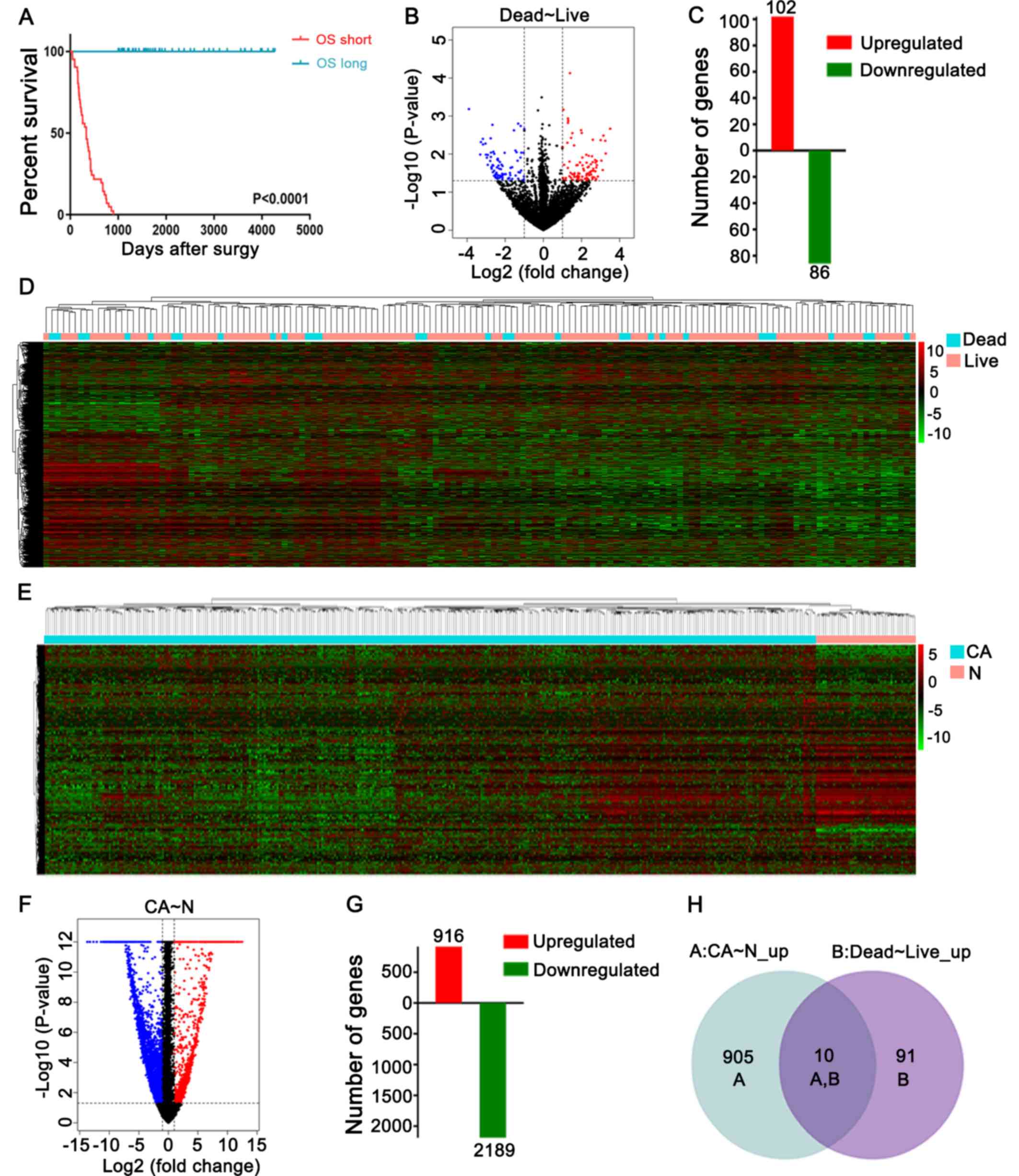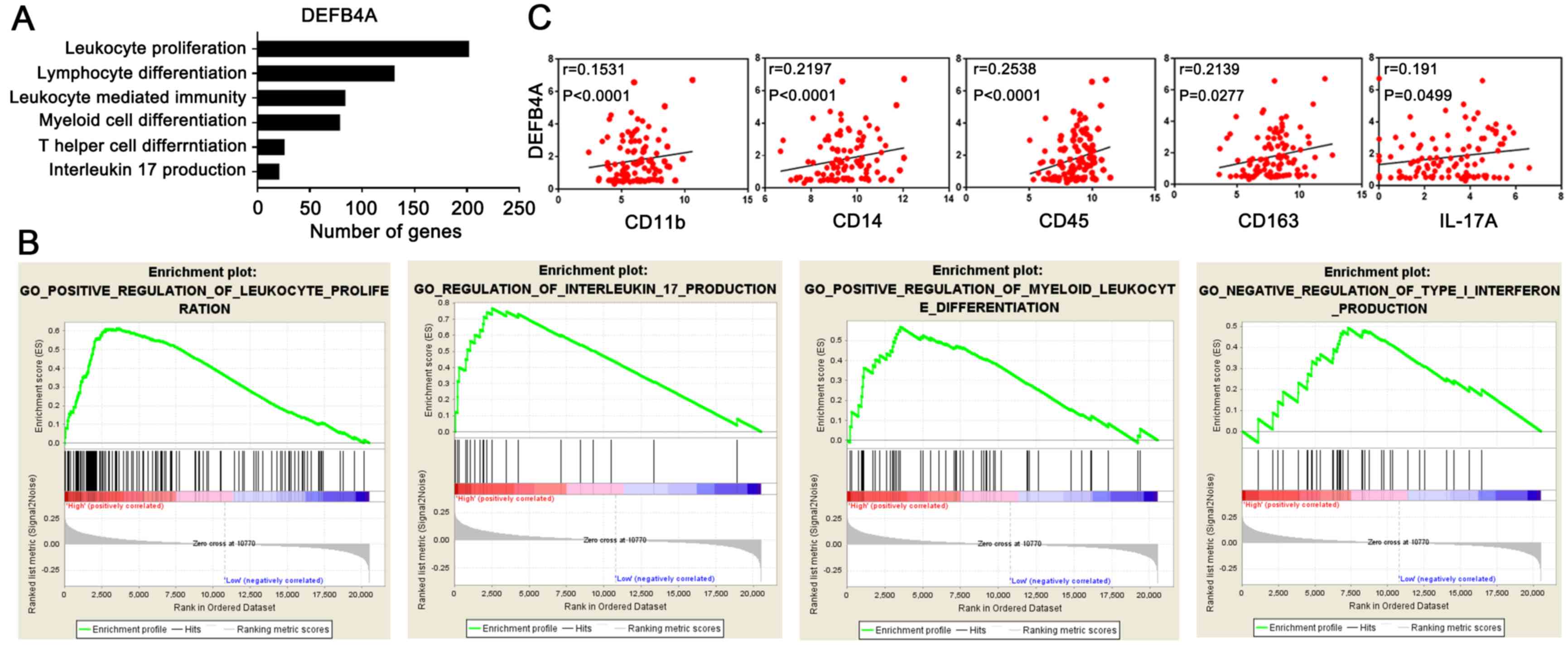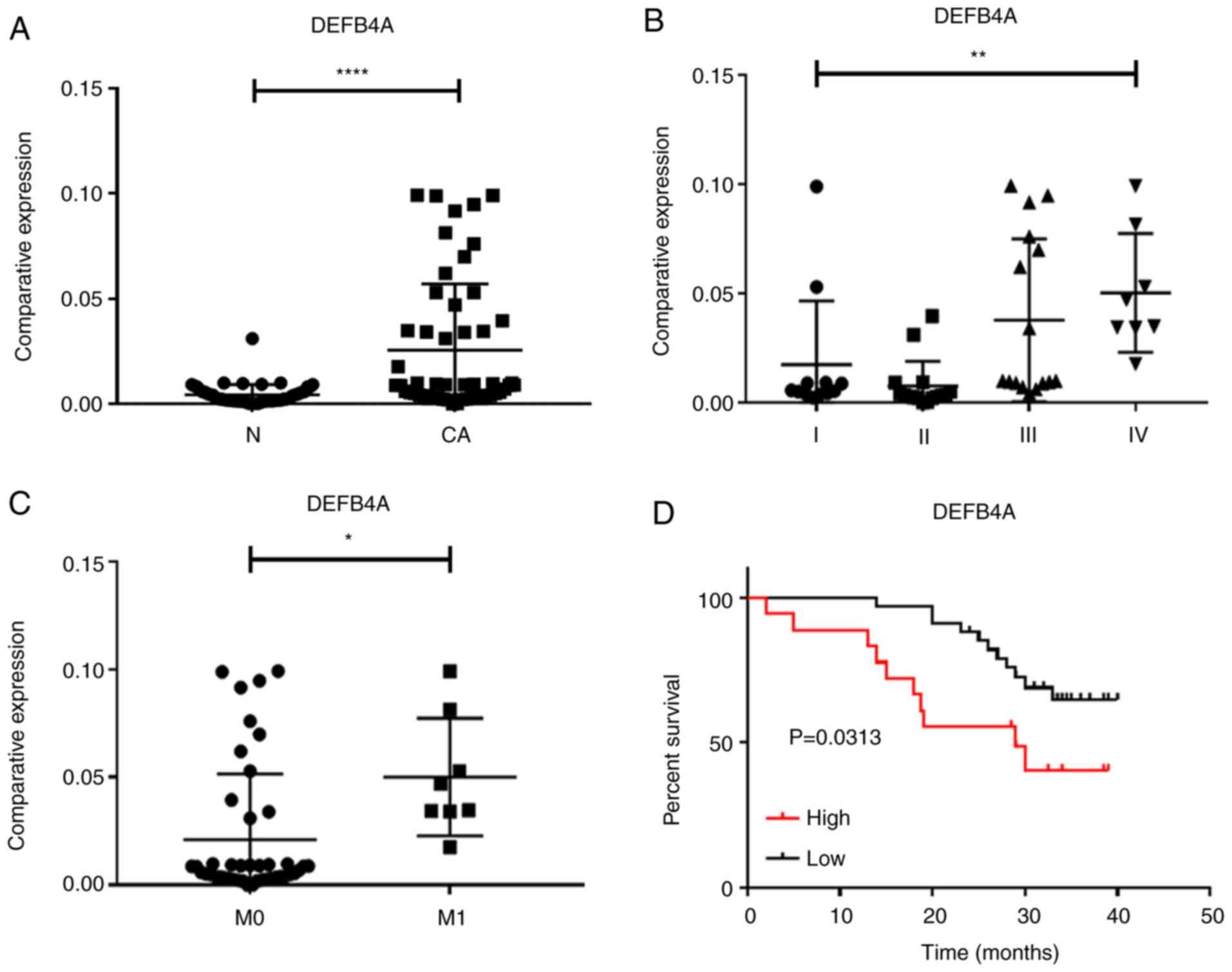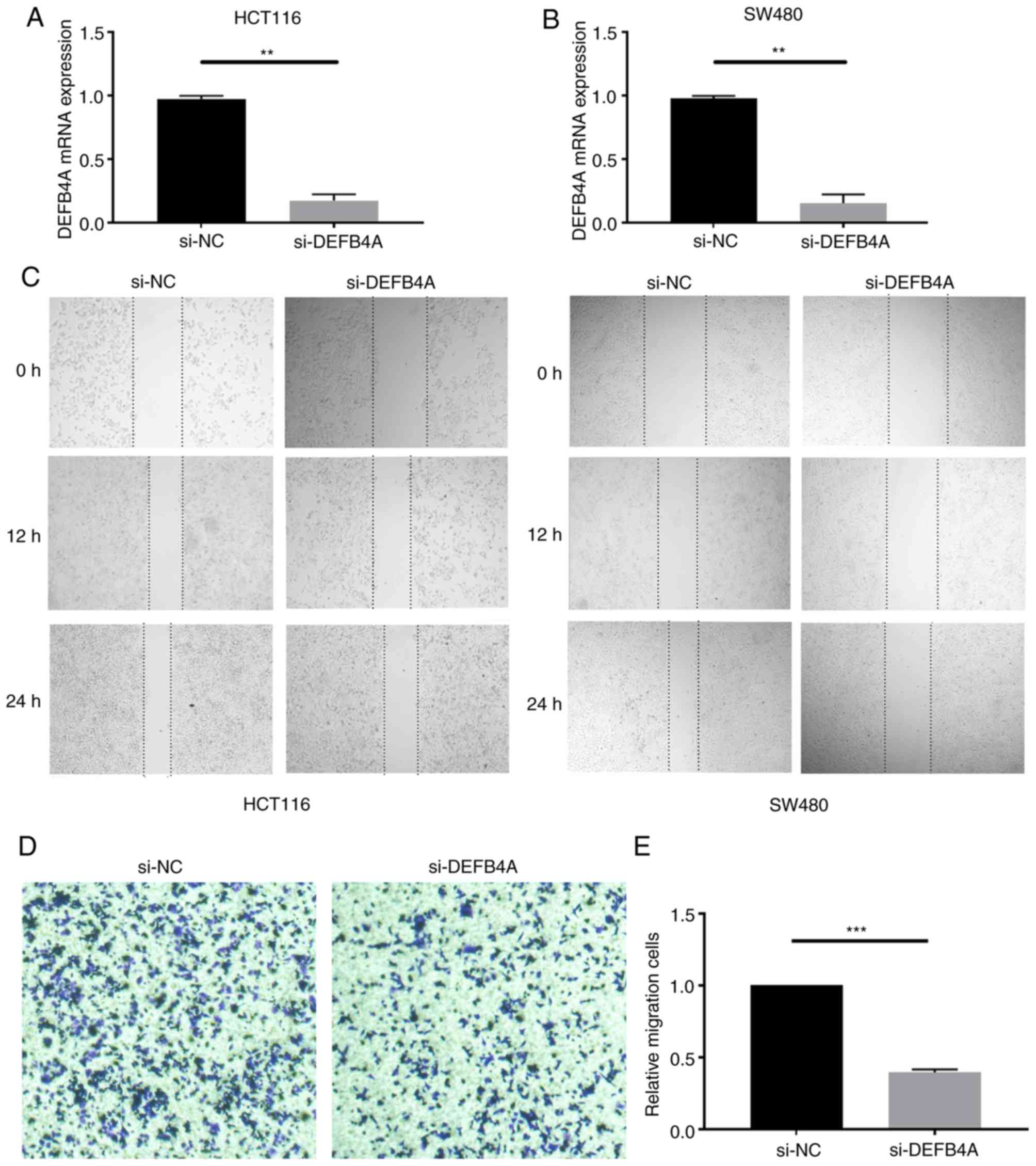|
1
|
Siegel RL, Miller KD and Jemal A: Cancer
statistics, 2020. CA Cancer J Clin. 70:7–30. 2020. View Article : Google Scholar : PubMed/NCBI
|
|
2
|
Cidon EU: The challenge of metastatic
colorectal cancer. Clin Med Insights Oncol. 4:55–60. 2010.
View Article : Google Scholar : PubMed/NCBI
|
|
3
|
Vreeland TJ, Clifton GT, Herbert GS, Hale
DF, Jackson DO, Berry JS and Peoples GE: Gaining ground on a cure
through synergy: Combining checkpoint inhibitors with cancer
vaccines. Expert Rev Clin Immuno. 12:1347–1357. 2016. View Article : Google Scholar
|
|
4
|
Siegel RL, Miller KD, Fedewa SA, Ahnen DJ,
Meester RGS, Barzi A and Jemal A: Colorectal cancer statistics,
2017. CA Cancer J Clin. 67:177–193. 2017. View Article : Google Scholar : PubMed/NCBI
|
|
5
|
Dickinson BT, Kisiel J, Ahlquist DA and
Grady WM: Molecular markers for colorectal cancer screening. Gut.
64:1485–1494. 2015. View Article : Google Scholar : PubMed/NCBI
|
|
6
|
Nikolouzakis TK, Vassilopoulou L,
Fragkiadaki P, Mariolis Sapsakos T, Papadakis GZ, Spandidos DA,
Tsatsakis AM and Tsiaoussis J: Improving diagnosis, prognosis and
prediction by using biomarkers in CRC patients (Review). Oncol Rep.
39:2455–2472. 2018.PubMed/NCBI
|
|
7
|
Dai L, Li J, Dong Z, Liu Y, Chen Y, Chen
N, Cheng L, Fang C, Wang H, Ji Y, et al: Temporal expression and
functional analysis of long non-coding RNAs in colorectal cancer
initiation. J Cell Mol Med. 23:4127–4138. 2019. View Article : Google Scholar : PubMed/NCBI
|
|
8
|
Qiu Z, Guo W, Wang Q, Chen Z, Huang S,
Zhao F, Yao M, Zhao Y and He X: MicroRNA-124 reduces the pentose
phosphate pathway and proliferation by targeting PRPS1 and RPIA
mRNAs in human colorectal cancer cells. Gastroenterology.
149:1587–1598 e11. 2015. View Article : Google Scholar : PubMed/NCBI
|
|
9
|
Ma Y, Zhang P, Wang F, Zhang H, Yang J,
Peng J, Liu W and Qin H: miR-150 as a potential biomarker
associated with prognosis and therapeutic outcome in colorectal
cancer. Gut. 61:1447–1453. 2012. View Article : Google Scholar : PubMed/NCBI
|
|
10
|
Toiyama Y, Takahashi M, Hur K, Nagasaka T,
Tanaka K, Inoue Y, Kusunoki M, Boland CR and Goel A: Serum miR-21
as a diagnostic and prognostic biomarker in colorectal cancer. J
Natl Cancer Inst. 105:849–859. 2013. View Article : Google Scholar : PubMed/NCBI
|
|
11
|
Hur K, Toiyama Y, Okugawa Y, Ide S, Imaoka
H, Boland CR and Goel A: Circulating microRNA-203 predicts
prognosis and metastasis in human colorectal cancer. Gut.
66:654–665. 2017. View Article : Google Scholar : PubMed/NCBI
|
|
12
|
Chen Z, Wu G, Ye F, Chen G, Fan Q, Dong H,
Zhu X and Wu C: High expression of MMP19 is associated with poor
prognosis in patients with colorectal cancer. BMC Cancer.
19:4482019. View Article : Google Scholar : PubMed/NCBI
|
|
13
|
Ganz T: Defensins: Antimicrobial peptides
of innate immunity. Nat Rev Immunol. 3:710–720. 2003. View Article : Google Scholar : PubMed/NCBI
|
|
14
|
Harder J, Bartels J, Christophers E and
Schröder JM: A peptide antibiotic from human skin. Nature.
387:8611997. View
Article : Google Scholar : PubMed/NCBI
|
|
15
|
Bajaj-Elliott M, Fedeli P, Smith GV,
Domizio P, Maher L, Ali RS, Quinn AG and Farthing MJ: Modulation of
host antimicrobial peptide (beta-defensins 1 and 2) expression
during gastritis. Gut. 51:356–361. 2002. View Article : Google Scholar : PubMed/NCBI
|
|
16
|
Wei W, Chen Y, Xu J, Zhou Y, Bai X, Yang M
and Zhu J: Identification of biomarker for cutaneous squamous cell
carcinoma using microarray data analysis. J Cancer. 9:400–406.
2018. View Article : Google Scholar : PubMed/NCBI
|
|
17
|
Gambichler T, Skrygan M, Huyn J, Bechara
FG, Sand M, Altmeyer P and Kreuter A: Pattern of mRNA expression of
beta-defensins in basal cell carcinoma. BMC Cancer. 6:1632006.
View Article : Google Scholar : PubMed/NCBI
|
|
18
|
Shi N, Jin F, Zhang X, Clinton SK, Pan Z
and Chen T: Overexpression of human β-defensin 2 promotes growth
and invasion during esophageal carcinogenesis. Oncotarget.
5:11333–11344. 2014. View Article : Google Scholar : PubMed/NCBI
|
|
19
|
Bentley RW, Pearson J, Gearry RB, Barclay
ML, McKinney C, Merriman TR and Roberts RL: Association of higher
DEFB4 genomic copy number with Crohn's disease. Am J Gastroenterol.
105:354–359. 2010. View Article : Google Scholar : PubMed/NCBI
|
|
20
|
Joyce JA and Pollard JW:
Microenvironmental regulation of metastasis. Nat Rev Cancer.
9:239–252. 2009. View Article : Google Scholar : PubMed/NCBI
|
|
21
|
Ortiz ML, Lu L, Ramachandran I and
Gabrilovich DI: Myeloid-Derived Suppressor Cells in the Development
of Lung Cancer. 2:50–58. 2014.PubMed/NCBI
|
|
22
|
Yang L, DeBusk LM, Fukuda K, Fingleton B,
Green-Jarvis B, Shyr Y, Matrisian LM, Carbone DP and Lin PC:
Expansion of myeloid immune suppressor Gr+CD11b+ cells in
tumor-bearing host directly promotes tumor angiogenesis. Cancer
Cell. 6:409–421. 2004. View Article : Google Scholar : PubMed/NCBI
|
|
23
|
Tacconi C, Ungaro F, Correale C, Arena V,
Massimino L, Detmar M, Spinelli A, Carvello M, Mazzone M, Oliveira
AI, et al: Activation of the VEGFC/VEGFR3 pathway induces tumor
immune escape in colorectal cancer. Cancer Res. 79:4196–4210. 2019.
View Article : Google Scholar : PubMed/NCBI
|
|
24
|
Cancer Genome Atlas Research Network, .
Comprehensive genomic characterization defines human glioblastoma
genes and core pathways. Nature. 455:1061–1068. 2008. View Article : Google Scholar : PubMed/NCBI
|
|
25
|
Gene Ontology Consortium, . The Gene
Ontology (GO) project in 2006. Nucleic Acids Res. 34:D322–D326.
2006. View Article : Google Scholar : PubMed/NCBI
|
|
26
|
Livak KJ and Schmittgen TD: Analysis of
relative gene expression data using real-time quantitative PCR and
the 2(-Delta Delta C(T)) method. Methods. 25:402–408. 2001.
View Article : Google Scholar : PubMed/NCBI
|
|
27
|
Liu Q, Cui X, Yu X, Bian BS, Qian F, Hu
XG, Ji CD, Yang L, Ren Y, Cui W, et al: Cripto-1 acts as a
functional marker of cancer stem-like cells and predicts prognosis
of the patients in esophageal squamous cell carcinoma. Mol Cancer.
16:812017. View Article : Google Scholar : PubMed/NCBI
|
|
28
|
Pan Z, Cai J, Lin J, Zhou H, Peng J, Liang
J, Xia L, Yin Q, Zou B, Zheng J, et al: A novel protein encoded by
circFNDC3B inhibits tumor progression and EMT through regulating
Snail in colon cancer Mol Cancer. 19:712020.PubMed/NCBI
|
|
29
|
Brock R, Xiong B, Li L, Vanbogelen RA and
Christman L: A multiplex serum protein assay for determining the
probability of colorectal cancer. Am J Cancer Res. 2:598–605.
2012.PubMed/NCBI
|
|
30
|
Solovjov DA, Pluskota E and Plow EF:
Distinct roles for the alpha and beta subunits in the functions of
integrin alphaMbeta2. J Biol Chem. 280:1336–1345. 2005. View Article : Google Scholar : PubMed/NCBI
|
|
31
|
Yang L and Zhang Y: Tumor-associated
macrophages: From basic research to clinical application. J Hematol
Oncol. 10:582017. View Article : Google Scholar : PubMed/NCBI
|
|
32
|
Cao L, Che X, Qiu X, Li Z, Yang B, Wang S,
Hou K, Fan Y, Qu X and Liu Y: M2 macrophage infiltration into tumor
islets leads to poor prognosis in non-small-cell lung cancer.
Cancer Manag Res. 11:6125–6138. 2019. View Article : Google Scholar : PubMed/NCBI
|
|
33
|
Li J, Xie Y, Wang X, Li F, Li S, Li M,
Peng H, Yang L, Liu C, Pang L, et al: Prognostic impact of
tumor-associated macrophage infiltration in esophageal cancer: A
meta-analysis. Future Oncol. 15:2303–2317. 2019. View Article : Google Scholar : PubMed/NCBI
|
|
34
|
Yagi T, Baba Y, Okadome K, Kiyozumi Y,
Hiyoshi Y, Ishimoto T, Iwatsuki M, Miyamoto Y, Yoshida N, Watanabe
M, et al: Tumour-associated macrophages are associated with poor
prognosis and programmed death ligand 1 expression in oesophageal
cancer. Eur J Cance. 111:38–49. 2019. View Article : Google Scholar
|
|
35
|
Tosolini M, Kirilovsky A, Mlecnik B,
Fredriksen T, Mauger S, Bindea G, Berger A, Bruneval P, Fridman WH,
Pagès F and Galon J: Clinical impact of different classes of
infiltrating t cytotoxic and helper cells (Th1, Th2, Treg, Th17) in
Patients with Colorectal Cancer. Cancer Res. 71:1263–1271. 2011.
View Article : Google Scholar : PubMed/NCBI
|
|
36
|
Huber S, Gagliani N, Zenewicz LA, Huber
FJ, Bosurgi L, Hu B, Hedl M, Zhang W, O›Connor W Jr, Murphy AJ, et
al: IL-22BP is regulated by the inflammasome and modulates
tumorigenesis in the intestine. Nature. 491:259–263. 2012.
View Article : Google Scholar : PubMed/NCBI
|
|
37
|
Grivennikov SI, Wang K, Mucida D, Stewart
CA, Schnabl B, Jauch D, Taniguchi K, Yu GY, Osterreicher CH, Hung
KE, et al: Adenoma-linked barrier defects and microbial products
drive IL-23/IL-17-mediated tumour growth. Nature. 491:254–258.
2012. View Article : Google Scholar : PubMed/NCBI
|
|
38
|
Kirchberger S, Royston DJ, Boulard O,
Thornton E, Franchini F, Szabady RL, Harrison O and Powrie F:
Innate lymphoid cells sustain colon cancer through production of
interleukin-22 in a mouse model. J Exp Med. 210:917–931. 2013.
View Article : Google Scholar : PubMed/NCBI
|
|
39
|
Wang X, Zhang L, Li H, Sun WJ, Zhang H and
Lai M: THBS2 is a potential prognostic biomarker in colorectal
cancer. Sci Rep. 6:333662016. View Article : Google Scholar : PubMed/NCBI
|
|
40
|
Hollox EJ, Huffmeier U, Zeeuwen PL, Palla
R, Lascorz J, Rodijk-Olthuis D, van de Kerkhof PC, Traupe H, de
Jongh G, den Heijer M, et al: Psoriasis is associated with
increased beta-defensin genomic copy number. Nat Genet. 40:23–25.
2008. View Article : Google Scholar : PubMed/NCBI
|
|
41
|
Liu PT, Schenk M, Walker VP, Dempsey PW,
Kanchanapoomi M, Wheelwright M, Vazirnia A, Zhang X, Steinmeyer A,
Zügel U, et al: Convergence of IL-1beta and VDR activation pathways
in human TLR2/1-induced antimicrobial responses. PLoS One.
4:e58102009. View Article : Google Scholar : PubMed/NCBI
|
|
42
|
Liu PT, Wheelwright M, Teles R,
Komisopoulou E, Edfeldt K, Ferguson B, Mehta MD, Vazirnia A, Rea
TH, Sarno EN, et al: MicroRNA-21 targets the vitamin D-dependent
antimicrobial pathway in leprosy. Nat Med. 18:267–273. 2012.
View Article : Google Scholar : PubMed/NCBI
|
|
43
|
Kolbinger F, Loesche C, Valentin MA, Jiang
X, Cheng Y, Jarvis P, Peters T, Calonder C, Bruin G, Polus F, et
al: β-Defensin 2 is a responsive biomarker of IL-17A-driven skin
pathology in patients with psoriasis. J Allergy Clin Immunol.
139:923–932.e8. 2017. View Article : Google Scholar : PubMed/NCBI
|
|
44
|
Holstein J, Fehrenbacher B, Bruck J,
Müller-Hermelink E, Schäfer I, Carevic M, Schittek B, Schaller M,
Ghoreschi K and Eberle FC: Anthralin modulates the expression
pattern of cytokeratins and antimicrobial peptides by psoriatic
keratinocytes. J Dermatol Sci. 87:236–245. 2017. View Article : Google Scholar : PubMed/NCBI
|



















